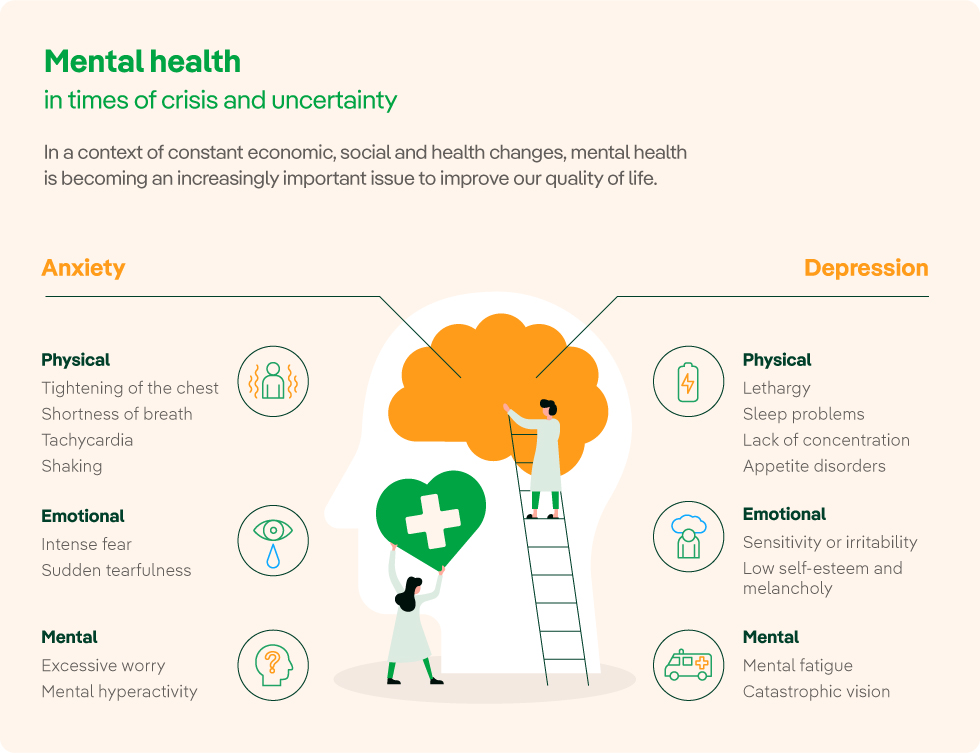Mental hygiene
Mental hygiene: learn about the things you need to do to look after your mind and keep a good quality of life
The World Health Organisation (WHO) itself makes it clear: "Mental health is an integral part of health; indeed, there is no health without mental health". Living in an ever-changing world puts our psychological well-being to the test and there is only one way to preserve it: by looking after our mental hygiene. Below we explain how to avoid negative behaviour, achieve emotional equilibrium and improve our quality of life.

In a society marked by constant economic, social and even health changes, psychological burnout represents a significant burden in the lives of millions of people. As the World Health Organisation (WHO) warns in a report on mental health in the world, nearly one billion people on our planet suffer from mental disorders such as frequent anxiety or depression. In this context, the shocking figure highlights the need to address the issue of mental health as a priority for the coming decades.
What is mental or psychological hygiene?
The psychological repercussions of facing a constant burden of anxiety, depression and stress have highlighted the need to maintain well-being through mental hygiene.This medical practice, initiated by the American psychiatrist Clifford Whittingham Beers back in 1909, defines the set of practices that allow a person to enjoy mental health and be in harmony with his or her socio-cultural surroundings. The behaviours that it covers are designed to prevent negative behaviour, provide emotional stability and improve quality of life.
Good mental health enables us to learn, reason, interact, produce, face difficulties and put our best face on things, to quote a few examples. That's why the UN and WHO warn that its decline presents a grave social and economic problem: depression and anxiety alone cause a loss of 12 billion working days each year globally, producing annual losses of almost 1 trillion dollars to the world economy.
Importance of mental hygiene
In today's world hit by human and health crises where some 280 million people suffer from depression, as the UN says, mental health has become a top priority for governments. The UN itself considers it imperative to urgently strengthen psychological care services in the face of alarming figures coming from some countries, which register only two mental health workers per 100,000 inhabitants.
In these difficult times, mental hygiene is the key to protecting society's most vulnerable, such as the young. Globally, one in seven young people (14%) aged 10-19 suffer from some form of mental disorder, a type of problem that accounts for approximately 13% of the global burden of disease in this age group. These figures should not be overlooked since suicide is the fourth leading cause of death worldwide in the 15-29 age group.

 SEE INFOGRAPHIC: Mental health in times of crisis and uncertainty [PDF]
SEE INFOGRAPHIC: Mental health in times of crisis and uncertainty [PDF]
Tips and habits of mental hygiene
Mental hygiene begins with the individual and we all need to look after our emotions, as the WHO recommends. For this, mental health experts agree on the need to adopt a series of habits for emotional self-care:
 Cover your basic needs
Cover your basic needs
The first thing we need to do to feel OK is to satisfy our basic needs, such as eating and sleeping properly. These are key to psychological well-being and we should not let them slip.
 Look after your self-esteem and learn to be trusting
Look after your self-esteem and learn to be trusting
To enjoy good mental hygiene it's important that we accept ourselves as we are. As well as having faith in ourselves, it's also important to trust others.
 Manage your emotions and learn self-control
Manage your emotions and learn self-control
This isn't about blocking out our feelings or letting them take us over, but rather about knowing how to identify and interpret them and regulate their intensity in order to respond appropriately. That is why it's key to emotional intelligence.
 Manage expectations and set concrete objectives
Manage expectations and set concrete objectives
Maintaining motivation and being perseverant is fundamental to surpass ourselves, which is why we need to set achievable goals so we do not become disheartened. We don't have to abandon our dreams, but we do need to manage expectations and reality.
 Think positively and be on the lookout for negative emotions
Think positively and be on the lookout for negative emotions
Sometimes, we're bound to be plagued by doubt and fears, but we can always counter them and limit their extent through positive thinking.
 Learn to relax and handle adversity
Learn to relax and handle adversity
Stress is a very useful natural bodily reaction to cope with adverse situations. But it can be very harmful to health when things settle down and we must learn to switch off. For instance, through techniques as mindfulness.
 Feed your social life and find support in others
Feed your social life and find support in others
As human beings we are sociable by nature and we need to interact with others to have fun and share our concerns.
 Exercise regularly
Exercise regularly
Regular exercise helps, not just to keep us physically fit and improve our health, but also to clear our heads. Resting for a while after sport is also important.




